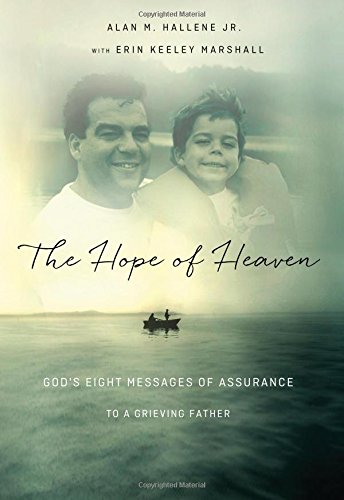The Hope of Heaven: God's Eight Messages of Assurance to a Grieving Father Hardcover – March 10, 2015
Hardcover: 176 pages
Publisher: Thomas Nelson (March 10, 2015)
Language: English
ISBN-10: 071802205X
ISBN-13: 978-0718022051
I found this book somewhat problematic. It's called Hope of Heaven by Allan M Hallene Jr. and it's a father's account of his son's suicide. So, yes it's important that the father has hope that his son will go to heaven. After all, Christians believe most suicides end up in hell because it is murder. I tend not to be cut and dried about where the souls of suicides go. We simply don't know the state of their souls or their minds.
In this memoir, the dad finds his son's body after the son has hung himself. At that moment, God gives him a clear image that assures him that his son is at peace in heaven. We all know that need for spiritual assurance when someone dies. I imagine it would be even worse if the person has died unexpectedly or by suicide. There is also the whole question of parental guilt and responsibility.
But the father gets these assurances. That could be a problem with me because I'm very wary of spiritual assurances. I'm generally wary of spiritual incidents, visions, dreams impressions etc as well. But something about assurances often makes me stop and ponder if the human mind wants to interpret things a certain way.
Some books are hard to review because you know the writer has poured his soul out for the reader and because you know the writer is stil experiencing emotional pain you have no idea about.
Another thing I'm wary about. The father is very calvinist/God's sovereignity. So he says stuff like God knew his son would kill himself because God knew his son was depressive and used those 23 years to help his son live and come as close to him so he could get to heaven. It's very subtle and I kinda get what the author is saying and maybe I kind believe him...but...wow. The father writes several times about his son's keeping his emotional pain to himself. And there are sections about the son being prone to these issues. I totally believe that there are pre-natal causes why some people are prone to depression. Perhaps there are genetic issues. And let's face it, God does not create bad genetics. It's a fallen world. There are also nutritional and even allergy-related depressions. And there are family dynamics. It's the family dynamics part of the equation that makes me uneasy. Even if the family isn't responsible for the depression, one wonders why this suicidal boy could not talk to his father. NOTE: I'm not saying the family could have helped him. I am not even saying the child feared his family so much that he couldn't tell them his heart. What I am saying is the father's repeated comments about how he tried to help his son just makes me wonder. Something about hearing something repeated a lot can do that. I'm just very cynical when it comes to Christians writing about themselves; I've seen too many self-deceptions. So wariness is not the author's fault, it's all mine.
In fact the author is really good at telling his heart, discussing theology (particularly the fatherhood of God), and rightly dividing the thorny theological issues. It's an interesting combination of theological paper, grief counseling, memoir, and PhD treatise with references.
Anyway, all that said, the comforting assurances, are very profound-- as assurances from God tend to be. And "if one is able to receive them", I think this book would be good for folks whose kids have committed suicide. Basically, this book would be considered a brave book in some Christian circles. And in other Christian circles, it would be considered a product of a wussy Christianity. It really all depends on one's denomination and how rigidly one thinks about things.
I received this book free in exchange for a fair and honest review.










